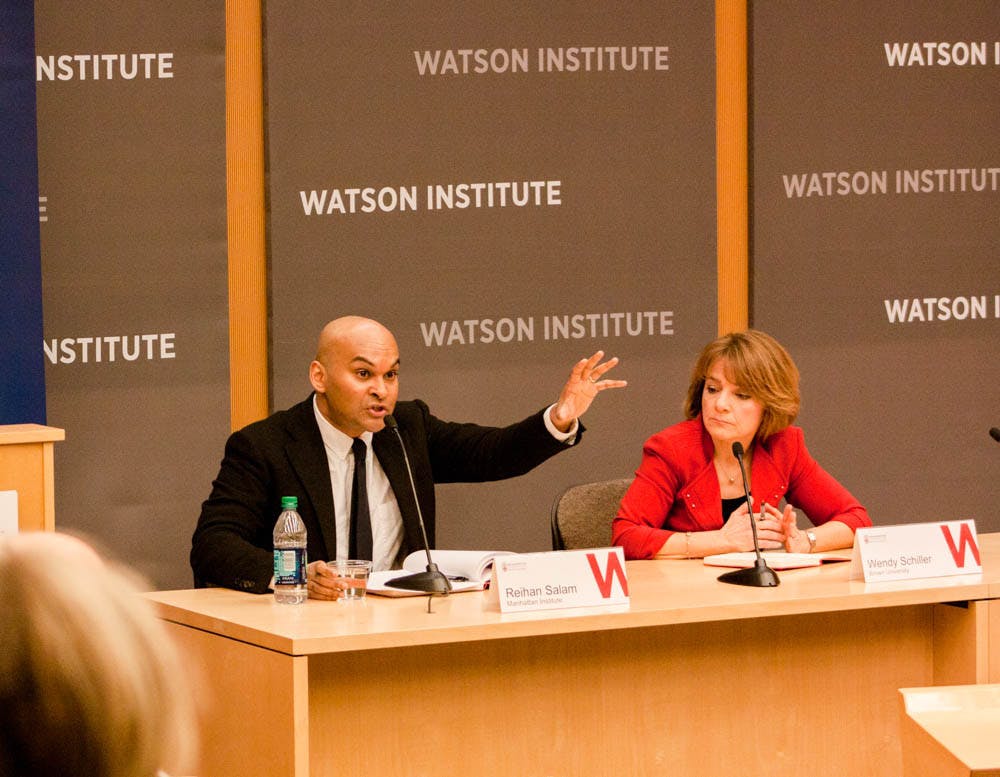Former Executive Editor of the conservative National Review Reihan Salam said that before he became an opinions columnist, he was “always a totally insufferable person,” volunteering his opinions.
“This was something that really lost me many friends and made me many enemies,” Salam said. “Then I discovered this was in fact a way one could make a living, and I’ve been inflicting my opinion on others ever since.”
In a lecture last night at the Joukowsky Forum called “One-nationism and the Future of American Politics,” Salam did inflict opinions on the audience, seeking to explain the role of cross-class bargaining and one-nationism in recent history and their implications for the future of the United States.
Cross class bargaining is when different social classes come together to forge a political consensus. One-nationism, a political philosophy first developed by 19th-century British Prime Minister Benjamin Disraeli, involves a “functioning society” that “strikes some sort of cross class bargain,” Salam said.
Salam was recently appointed president of the Manhattan Institute, a free-market think tank based in New York City. He has also contributed pieces to The Atlantic and National Affairs, and he has authored two books.
His talk featured a conversation afterwards with Wendy Schiller, chair of the political science department, as well as an audience question and answer.
As examples of cross-class bargains, Salam pointed to reconstruction in Western Europe after World War II, highlighting Denmark and Switzerland as small countries that had to make bargains out of necessity.
Salam emphasized the idea of the “paradox of vulnerability,” in which individual countries that are smaller, less powerful and more vulnerable are more likely to engage in cross-class bargaining than larger and more powerful countries.
“So when you think about the habit and practice of forming those bargains,” Salam said, “in American life, that hasn’t always been the most vividly present thing in our politics.”
Salam said that the United States has occupied a powerful and relatively safe place in the world for decades, reducing the pressures that encourage internal bargaining. But now the United States is having to face external pressures again.
“I would argue that right now the United States is in a very different position then it has been in previous decades,” Salam said. “We’re going through right now what you’d call a triple transition.”
An aging population, an economy switching to more automation and service work and the growing strength of other countries in the world, such as China, are all forces that are making the United States vulnerable, Salam said.
“That’s going to expose the United States to the kind of vulnerability that our political culture is not accustomed to,” Salam said about the triple transition. “The interesting question is, what will be our response to that? Will we build up the muscles that allow for some kind of cross class collaboration, or will we fail to do so and find ourselves mired in new kinds of chaos?”
He pointed out the “thermostatic reactions” of the American voting public between liberalism and conservatism as a sign of increasing vulnerability. As a result, the United States needs a new cross-class bargain to form “a durable basis for a new politics.”
In discussion with Schiller, the two debated about the place of a shared cultural identity in the United States and how the glue that once kept the United States together is fraying. In response to Salam’s idea of a new cross class bargain, Schiller questioned what role marginalized groups could play in such a compromise.
When asked after the event about the capacity millenials and college students have to bargain and compromise, Salam told The Herald “I think this habit and practice of bargaining is a product of necessity. And whether you do it or not is less about the generational cohort and more about the environment in which we find ourselves.”
He mentioned that a “politically monolithic” community like Brown, where many people share similar political views, “is not necessarily a place where your world is going to be stress-tested. That’s not the ideal place that (bargaining skills) emerge.”
While he acknowledged that building those bargaining skills is difficult, he recommended trying to “talk to intelligent and thoughtful people who don’t share your (views), that’s a good thing to do.”
After the event, Dominique Kercy ’19 and Chinenye Uduji ’19 both said they were interested to see a more conservative speaker on campus and to learn from those who don’t share their viewpoint.
“I think it’s interesting to get a more robust image of what identities a conservative might hold,” Kercy said.
“I’m not going to sit here and say I necessarily agree with a lot of what was said,” Uduji said. “But I think it helps me understand where those people are coming from so you can help craft appeals that would be more supported by those who are conservative.”





